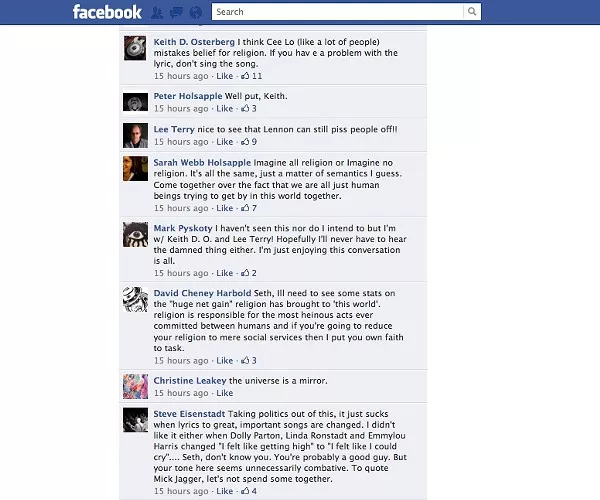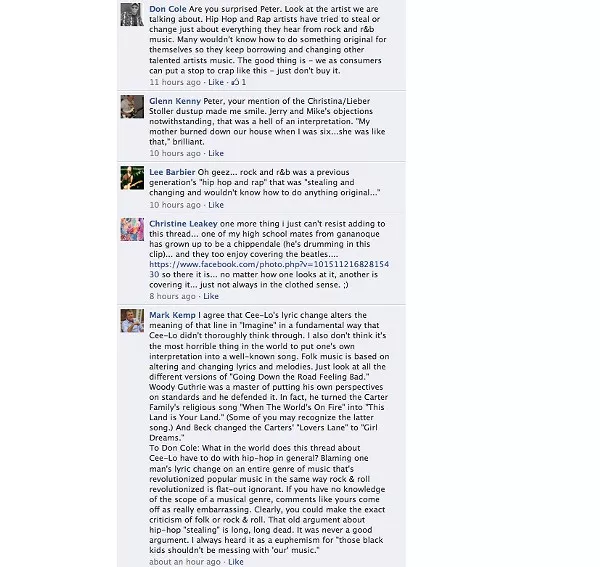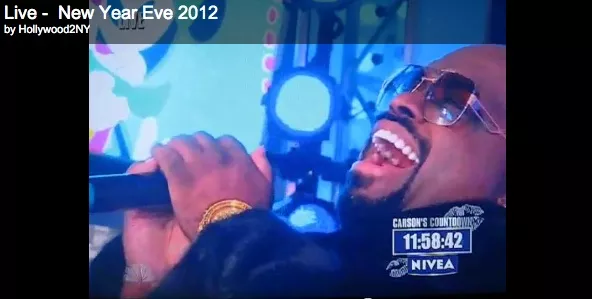Monday, January 2, 2012
Music Cee-Lo v. John Lennon: To "religion" or not to "religion"
Posted By Mark Kemp on Mon, Jan 2, 2012 at 10:25 AM
A great debate is going on in the pop world over Cee-Lo Green's changing of the words to John Lennon's "Imagine" during a performance of the song in Times Square on New Year's Eve. It was a change that seems to contradict the intent of the song. In his performance, Cee-Lo sang the late Beatle's secular humanist line "Nothing to kill or die for/And no religion too" to the more religion-friendly "And all religion's true." Many Lennon fans are outraged. Religious folks — maybe not so much. And then there are those who say, heck, it's all semantics anyway. If all religion is true, then maybe it's the same as there being no religion.
Whatever the case, the debate re-raises the question of how far a singer should be able to go in his or her interpretation of another songwriter's work.
The best debate I've seen so far is happening in a thread on the Facebook page of North Carolina singer/songwriter Peter Holsapple, founding member of the great New Wave-era jangle-pop band The dB's. Holsapple linked the Huffington Post story on the incident along with the words, "Um, no. Not yours to change. Very bad idea."
Later in the thread Holsapple argued, "I do not think that artists should rewrite a songwriter's intended lyrics, especially when the rewrite changes the theme of the line. I think parody is one thing (see Weird Al or the Barron Knights), but I don't think Mr. Green was doing anything of that sort. Any worthwhile parodist has the sense and grace to ask the author or publisher for permission. I don't get the feeling Mr. Green did that, or that it even occurred to him." Holsapple's point is valid, and most of the songwriter's FB friends agreed with him.
I do not totally agree. While I am not a songwriter and can't fully empathize with a songwriter's point of view on this issue, I have written extensively about popular music for many years and spent much time studying folk-music history. (When I use the term "folk," I am not simply referring to acoustic-guitar-based music, but any musical style made for, and communicating to, the masses rather than the elite.) From a music-history perspective, I don't see a lot of difference between Cee-Lo's interpretation of "Imagine" and the interpretations that folk-based singers and songwriters have been doing for centuries. From the Elizabethan-period traveling troubadours of England to American folksingers like Woody Guthrie, and from the reconstituted blues of Led Zeppelin to the sample-heavy tapestries of Public Enemy, songwriters have been rewriting the words, melodies and perspectives of their forebears' works since the first musician began banging on a rock.
Of course, there is a fuzzy legal line that musicians cross when commerce comes into play. That's why John Lennon's fellow Beatle George Harrison was sued when he adopted the melody of the Chiffons' '60s hit "He's So Fine" for his own hit "My Sweet Lord." Likewise, Led Zeppelin was eventually sued by blues songwriter Willie Dixon for adapting his song "You Need Love" for their popular hard-rock track "Whole Lotta Love." By contrast, the great songwriter Woody Guthrie was not sued for adopting the melody of the Carter Family's religious song "When The World's On Fire" for his own "This Land is Your Land" (you may be familiar with the latter tune). In my opinion, all of these songs are classics — and all benefited from the perspectives each musician brought to them.
My point is that music and art are constantly evolving. Cee-Lo Green clearly hears the concept of "no religion" as being consistent with "all religion," and that's how he interpreted John Lennon's song for himself. As a music historian of sorts and a music fan, I don't have a problem with that. I also don't see Cee-Lo's change as being disrespectful — I see it as continuing a much-needed dialog. To me, that's what folk and popular music should do.
What do you think?
Here's a pair of screen shots showing parts of the thread on Holsapple's Facebook page. Check it out:


Speaking of...
Comments (11)
Showing 1-11 of 11














